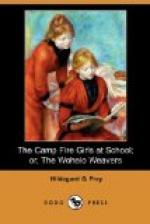Gladys stood up in the center of the room and began: “Once upon a time there were a group of Camp Fire Girls called the Winnebagos, and they went to school in the Professors’ big tepee on the avenue, where they pursued knowledge for all they were worth. So much wisdom did they imbibe that it was necessary to wear a head band to keep their heads from splitting open. Wherever they went they were immediately recognized by their rings and bracelets, and were pointed out as ’those dreadful young savages.’ The professors and teachers hoped every day that they would not come to school, but they never stayed away because they received honor beads from their Guardian Mother for not being absent. Sometimes it seemed as if the tricks they did in class room could only have been accomplished by their having consulted one another, and yet it was impossible to catch them whispering in class because they always conversed by hand signs. However, this also led to disaster one day when one of our well-beloved sisters of the bow and drill tried to make the hand sign for ‘girl,’ and raised her hand above her head. The Big Chief, who was conducting the lesson, thought she wanted something, and said benevolently: ‘What is your desire?’ Absent-mindedly she replied, ’It is my desire to become a Camp Fire Girl and obey the Law of the Camp Fire, which is to seek beauty, give service, pursue knowledge, be trustworthy, hold on to health, glorify work, and be happy,’ ‘Begone,’ said the Big Chief, ‘what do you think this is, a Ceremonial Meeting?’”
At the words “Ceremonial Meeting” all the girls jumped up to change places, and in the scramble a vase was knocked off the table and broken. Every one sat rooted to the spot with fright, all except Mr. Bob, who fled at the sound of the crash as if he had been the guilty one. Hinpoha calmly collected the pieces and carried them out. “My mother will be extremely grateful to you for this when she comes home,” she said. “If there was one vase in the house she hated it was this one. My Aunt Phoebe brought it from the World’s Fair in Chicago and thinks it’s the chief ornament of our home. Won’t mother be glad when she finds it broken and she can prove that none of us did it?” The tension relaxed and the girls breathed easily again.
“When are your mother and father coming home?” asked Nyoda.
“They sailed last week on the Francona,” answered Hinpoha.
“Weren’t you worried to death to have them in Europe so long with the war going on?” asked Migwan.
“No, not much,” said Hinpoha, “because they have been in Switzerland all the while, which is safe enough, and as they are coming home on a neutral vessel they have had no trouble getting passage. They should be here in a week.” And Hinpoha’s eyes shone with a great, glad light, for although she had been having the jolliest time imaginable, doing as she pleased in the house, which was in the care of easy-going “Aunt Grace,” who never cared a bit what Hinpoha did so long as it did not bother her, she missed her mother sorely, and could hardly wait until she returned. Nyoda saw the transfigured look that came into her eyes when she spoke of her mother’s home coming, and her own eyes went dim, for her mother had died when she was just Hinpoha’s age.




